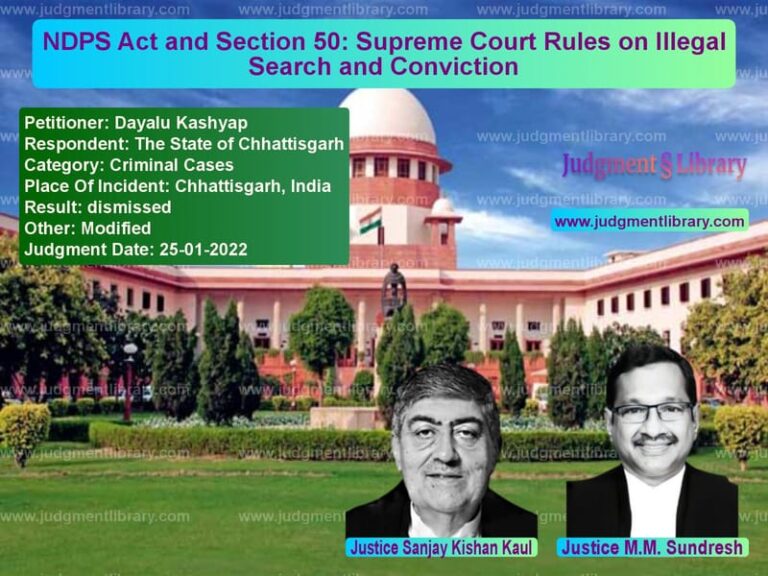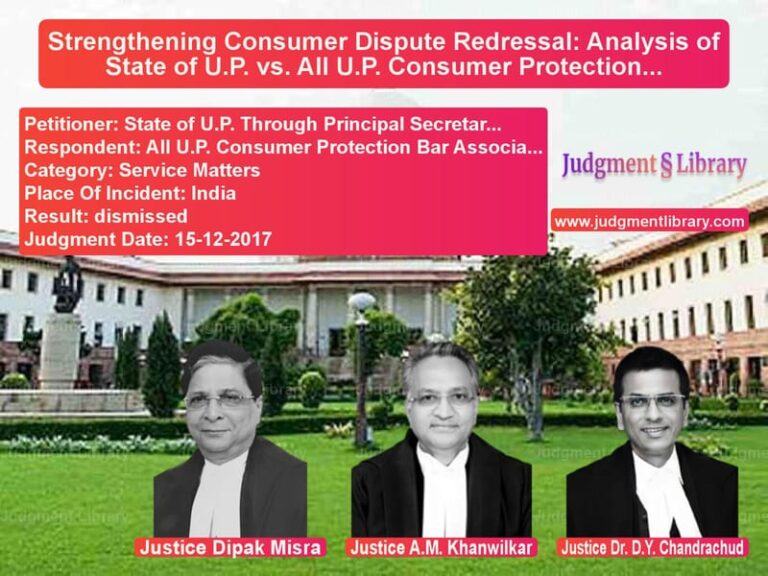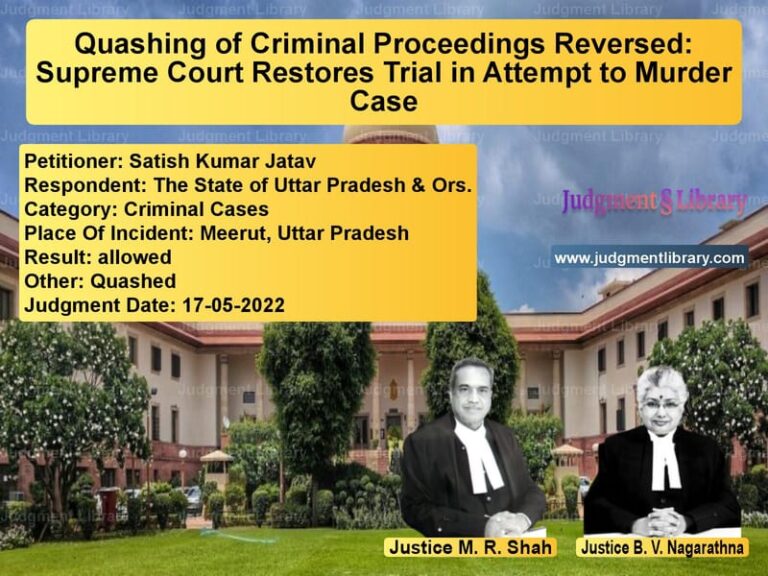Revisional Power Under Repealed Tax Law: State of Haryana vs. Hindustan Construction Co. Ltd.
The case of State of Haryana vs. Hindustan Construction Co. Ltd. revolves around the crucial legal question of whether the State can invoke its revisional powers under a repealed tax law. The case primarily concerns the applicability of Section 40 of the Haryana General Sales Tax Act, 1973 after its repeal by the Haryana Value Added Tax Act, 2003. The Supreme Court examined whether tax authorities could retrospectively exercise revisional powers for past assessments when the new law had come into force.
The appeal was filed by the State of Haryana after the High Court ruled against its attempt to revise an earlier tax refund granted to Hindustan Construction Co. Ltd. The company had received a refund in 2000 under the repealed Sales Tax Act, and the government sought to revise this assessment in 2004, after the new VAT law had replaced the earlier legislation.
Background of the Case
The respondent, Hindustan Construction Co. Ltd., had filed its tax returns for the financial year 1998-99 under the Haryana General Sales Tax Act, 1973. The tax assessment was completed, and a refund of Rs. 65,35,632 was issued on 12.05.2000.
Subsequently, the Haryana General Sales Tax Act, 1973, was repealed, and the Haryana Value Added Tax Act, 2003, came into effect from 01.04.2003. More than a year later, on 07.06.2004, the State of Haryana issued a show cause notice seeking to revise the tax assessment under Section 40 of the repealed Act. The revisional order was passed on 12.07.2004, declaring that the tax refund had been wrongly granted.
The company challenged the order in the High Court, arguing that the tax authorities could not invoke a repealed Act to revise an earlier assessment. The High Court ruled in favor of Hindustan Construction Co. Ltd., leading to an appeal by the State before the Supreme Court.
Legal Issues
The Supreme Court identified the following key legal issues:
- Can the State invoke its revisional powers under a repealed tax law?
- Does Section 40 of the Haryana General Sales Tax Act, 1973, survive after the enactment of the Haryana Value Added Tax Act, 2003?
- Does the repeal and saving clause in Section 61 of the new VAT Act allow the government to reopen past assessments?
- Can Section 4 of the Punjab General Clauses Act, 1898, be used to justify the exercise of revisional power under the repealed law?
Arguments by the Appellant (State of Haryana)
The State of Haryana argued:
- The refund granted to Hindustan Construction Co. Ltd. was erroneous and needed to be corrected through suo motu revision under Section 40 of the repealed Sales Tax Act.
- The repeal and saving clause in Section 61 of the Haryana VAT Act, 2003, preserved the government’s right to rectify past errors.
- Section 4 of the Punjab General Clauses Act, 1898, allowed the continuation of privileges, obligations, and liabilities even after the repeal of the earlier tax law.
- The revisional power was exercised within the five-year limitation period specified in the old Act.
Arguments by the Respondent (Hindustan Construction Co. Ltd.)
The respondent, Hindustan Construction Co. Ltd., countered with the following arguments:
- The Haryana General Sales Tax Act, 1973, was repealed on 01.04.2003, and no proceedings were pending against the company at that time.
- The new VAT Act only saved pending proceedings, not new revisional actions initiated after its enactment.
- Once the new VAT Act came into force, the government could not invoke the repealed Act to revise old tax assessments.
- The amendment to Section 61 of the VAT Act in 2010, which extended the limitation period for certain revisions, did not apply retroactively.
Observations of the Supreme Court
The Supreme Court examined the repeal and saving clause in the Haryana VAT Act, 2003. It noted:
‘The repeal and saving clause in Section 61 of the Act of 2003 saved only pending proceedings under the repealed Act. Since there were no proceedings pending against the respondent under the repealed Act on the relevant date, the proceedings thereunder could not be sustained.’
The Court further held:
‘Section 4 of the Punjab General Clauses Act, 1898, will have no application in view of the contrary intendment expressed in Section 61 of the repealing Act.’
The Court concluded that the intention of the new VAT law was to provide a fresh legal framework for tax administration, and it did not permit retrospective application of the repealed law.
Final Judgment
The Supreme Court upheld the ruling of the High Court and dismissed the appeal filed by the State of Haryana. The Court ruled:
- The exercise of suo motu revisional power under Section 40 of the repealed Haryana General Sales Tax Act, 1973, after its repeal, was unsustainable.
- The repeal and saving clause in the new VAT law did not allow fresh revision of past assessments.
- The Punjab General Clauses Act, 1898, could not be used to override the specific provisions of the Haryana VAT Act, 2003.
The Court concluded that once a law is repealed and replaced with a new one, the government cannot invoke the old law to reopen concluded matters unless specifically authorized by the new legislation.
Impact of the Judgment
This ruling has significant implications for tax administration and legal interpretation:
- It clarifies that revisional powers under a repealed tax law cannot be exercised unless expressly saved by the new legislation.
- It reinforces the principle that tax authorities cannot use general savings clauses to override specific repeal provisions.
- It protects taxpayers from retrospective actions by the government under repealed laws.
Conclusion
The Supreme Court’s judgment in State of Haryana vs. Hindustan Construction Co. Ltd. reaffirms the legal principle that once a tax law is repealed, its provisions cannot be applied retroactively unless expressly permitted. The ruling serves as an important precedent in taxation law, ensuring that tax authorities cannot arbitrarily reopen assessments under repealed statutes. The decision provides clarity on the interpretation of repeal and saving clauses in fiscal legislation and safeguards the rights of taxpayers from retrospective revisions.
Don’t miss out on the full details! Download the complete judgment in PDF format below and gain valuable insights instantly!
Download Judgment: State of Haryana & O vs Hindustan Constructi Supreme Court of India Judgment Dated 15-09-2017.pdf
Direct Downlaod Judgment: Direct downlaod this Judgment
See all petitions in Income Tax Disputes
See all petitions in Tax Evasion Cases
See all petitions in GST Law
See all petitions in Judgment by Ranjan Gogoi
See all petitions in Judgment by Navin Sinha
See all petitions in dismissed
See all petitions in supreme court of India judgments September 2017
See all petitions in 2017 judgments
See all posts in Taxation and Financial Cases Category
See all allowed petitions in Taxation and Financial Cases Category
See all Dismissed petitions in Taxation and Financial Cases Category
See all partially allowed petitions in Taxation and Financial Cases Category







